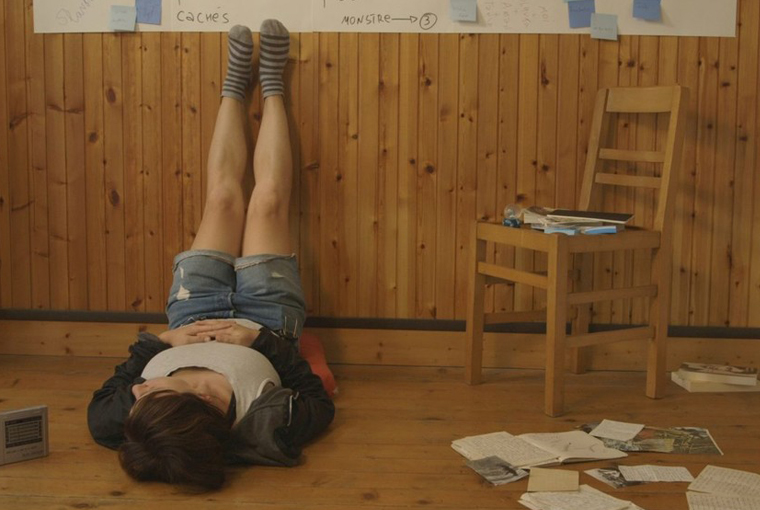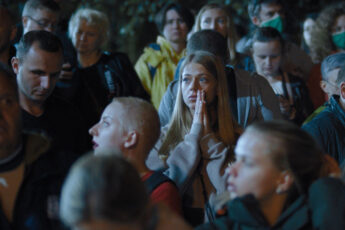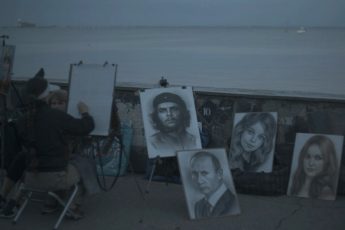In Praise of Marginality
Elitza Gueorguieva’s Our Quiet Place (Un endroit silencieux, 2021)
Vol. 119 (November 2021) by Zoe Aiano
In France, two young women of Eastern European origin meet and bond over a shared quest to master French, not only as a means of communication but more specifically as a tool for self-expression through writing. The documentary Our Quiet Place tells the story of one of them, Aliona Gloukhova, through the eyes of the other, Elitza Gueorguieva, as together they explore the advantages of co-opting a foreign language.
The film is structured around the writing of Aliona’s book, which addresses the disappearance of her father, a sailor whose ship was wrecked off the coast of Turkey when Aliona was a child and who was never found again, either dead or alive. Given the obvious delicacy and personal nature of the topic, Aliona is convinced that writing in a newly learned language will give her the freedom to both express and process her feelings in a more detached manner. This is the basic premise of the film, which argues that abandoning your mother tongue creates space for negotiating culture and identity differently, allowing for distance and imagination. As a more generalized existential extrapolation of this, the two protagonists reverse the trope of immigrants striving to conform and instead extol the virtues of life in the margins, and the benefits that come from only partially belonging. By choosing a new (hegemonic) language while also rejecting any aspiration of full assimilation, they are not denying or rejecting their identities, but rather taking a form of active determination over them.
The film thus plays on notions of parallels – between the predicaments of the two women, between Aliona’s journey and that of her father, and between the act of constructing a narrative in different media. Of course, given that this is a film that is about negotiating language, it is important to consider the fact that the director is not only navigating verbal languages but also the visual. Various approaches are combined to tell both the story and the story of the story, which are interwoven together. Part of the footage takes the form of a dialogue between the two authors as they discuss literary theory or details of the writing process, the camera pointed at Aliona while Elitza remains a voice heard off-screen. Most frequently, however, Elitza’s voice is actually present inaudibly in the form of subtitles written in second person, i.e. to Aliona. This strengthens their bond, as well as Elitza’s stake in the issue, even if her own backstory is never fully revealed.
The bulk of the film is dedicated to retracing Aliona’s story, starting from her native Belarus and ending with the site of the accident in Turkey. At times, she revisits members of her family to compare and contrast versions of events, breaking the taboo of speaking about it at all. Most interestingly, excerpts of her developing narrative are told over observational footage of the locations in question, primarily Minsk, the random passers-by unknowingly serving as stand-ins for the real characters and real events. Like the book being written, these images also blur the border between reality and subjective interpretation, the cinematic process thereby emulating the writing process.
Moreover, just as Aliona purposely displaces herself to adopt a new perspective, Elitza’s gaze in relation to Belarus is that of someone for whom, as a Bulgarian, the culture is both familiar and foreign at the same time. While she is guided by Aliona physically and geographically, the fact of holding the camera allows her to frame her experiences from her own first-person viewpoint. Intentional or not, one of the results of this is a refreshingly non-stereotypical depiction of Eastern Europe. A political stance is clearly acknowledged: Aliona notes that all her family has left Belarus and is unable to imagine ever going back, and she also implies that if Lukashenko’s regime had fallen, her father wouldn’t have been so desperate to leave and would therefore potentially still be alive. Nevertheless, the political remains secondary to the personal, and the fact of where the story takes place is ultimately incidental.
On the whole, Our Quiet Place is a subtle and delicate work that manages to convey an abstract notion in a compelling and layered way, the form emulating the content in a symbiotic way that allows the director to explore it more fully. It raises many points of reflection that are sure to linger with audiences long after the screening, even if they wouldn’t have thought that these topics apply to them.




Leave a Comment